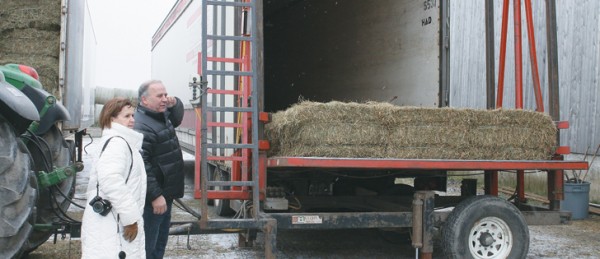
When Berend and Karen Ridder agreed to appear on a local Calgary television show, one of their goals was to show urban residents that milk does not come from the grocery store.
They wanted to project a positive message from their dairy farm near Didsbury, Alta. and do some myth busting at the same time.
“There is so much social media stuff out there … that are the dumbest things. They don’t make sense at all,” said Karen.
“It is better to say something positive about a farm, no matter what kind of farm it is,” said Berend.
“We live off the land so we better take care of it, otherwise there is no future for us or our kids,” he said.
They have four children under the age of seven: Sem, 7, Mike, 5, Ella, 3 and Jace, five months.
At this point, the children’s future is undetermined.
“At least they think farming is a good lifestyle and a good way of life. They don’t have to become a farmer but as long as they get that out of it, I am happy,” Berend said.
They milk 130 purebred Holsteins and work with Berend’s parents Jan and Joanne who are heading toward retirement.
Berend and Karen immigrated to Canada from the Netherlands with their families in 1998. Both were 17 and met in Canada six months after their arrival.
Both attended Olds College where Karen became a florist and Berend eventually transferred to Lakeland College at Vermilion to complete his education in dairy management before joining the family’s Buffalo Rock Farm.
A desire to expand drove both families to leave Europe. Karen came from the western part of the country where land was being lost to urbanization. Berend’s father and uncle farmed and milked 50 cows but there was no room to grow.
“If we had stayed in Holland, my dad and I would have had to work outside the farm. It just wasn’t feasible,” he said.
Canada was an easy choice.
“Canada is a good place to farm. It is a stable country. If you look at Eastern Europe, it is a different story and that is why we chose Canada.”
They were accustomed to a milk quota system and quickly learned that the Canadian supply management program provided a good living.
“The banks are willing to invest in supply management because it is stable. It is self-sufficient. There are no good or bad times and there are not really any surprises,” he said.
Alberta is home now, but there were adjustments. Both spoke English and quickly made friends, but the approach to farming was different.
“The biggest change was the way everything is done as far as farming goes. The only thing that is the same is the cows still eat and drink and poop,” Berend said.
“Everything was different. The weather was different, the cows were different,” Karen said.
The growing season is shorter and the unpredictability of Alberta weather in the chinook belt presented challenges in putting up feed or getting crops off before the snow or rain beat them down.
Cattle tended to go on grass in Europe whereas here they are receiving prepared feeds.
“This is our home now. Next year we have lived just as long in Canada as we ever did in Holland. It is nice to go back and visit, but never to live,” said Karen.
Every few years, they made im-provements with new manure handling, heifer barns, better maternity pens and most recently, a calf barn where the youngsters will live in groups and receive milk from an automatic feeding system.
They have a young herd and keep all their own replacements. The herd is closed, the farm is a biosecure unit and an environmental farm plan has also been completed.
They prefer a hands-on approach in the barn. While operations are computerized to monitor milk production, heat cycles and behaviour changes, Berend still relies on being a cow manager where he knows the individuals and their daily needs.
“When we milk and something is wrong and we know that cow, we know when she is abnormal,” he said.
They also make time for fun.
During the winter months, Berend trains outdoors as a marathon speed skater at Red Deer. Two years ago, he won a 100 kilometre marathon speed skating competition staged outdoors on Sylvan Lake.
“With dairy farming, it is a bit like endurance. It is not sprinting and slowing down, it is steady,” he said.
Source: The Western Producer









